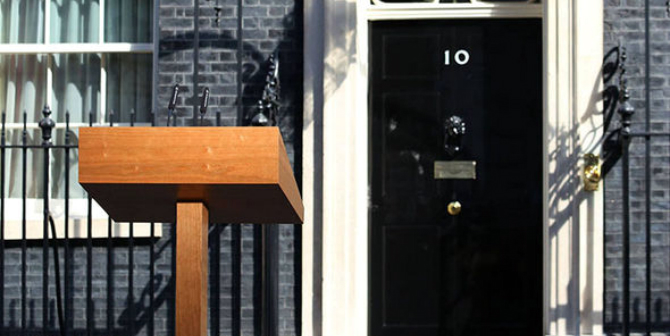Lockdown and Easter combined to quell talk of Brexit – but not for long. With Michel Barnier back at work, post-Brexit negotiations are to resume next week. But can the transition talks really be concluded by the end of 2020? Roch Dunin-Wąsowicz and Ros Taylor (LSE) round up the latest developments.

It’s official: the next tranche of transition talks will begin via video call next Wednesday, with further sessions scheduled in following months. EU chief negotiator Michel Barnier has fully recovered from coronavirus. There is, however, little clarity about what they will cover. The political will exists to carry out the negotiations, but the technical side of things isn’t going too smoothly:
8/ Member states are also frustrated that the UK has insisted its draft text not be shared it them. Instead the Commission can only share its "analysis" with member states. This is also slowing things up.
— Tony Connelly (@tconnellyRTE) April 13, 2020
Fisheries appear to be off the menu for the time being:
EU diplomats grumpy that UK is denying Barnier permission to share the UK legal texts. That means 27 member states, who will ultimately decide final deal, so far relying on commission reports and analysis. The UK not producing any text on fisheries is seen as a bad sign.
4.— Jennifer Rankin (@JenniferMerode) April 14, 2020
Still, many think the coronavirus crisis may allow a more moderate compromise to be reached and that an extension is quite likely in the end. (According to Denis McShane, coronavirus may become Boris Johnson’s ‘get out of jail’ card on Brexit.) The problem is that such an extension needs to be agreed by 1 July – including an interim financial settlement – and that it will be Britain’s last opportunity to extend.
‘The EU is ready to engage; it is time for the UK, even in private, to do the same,’ says Georgina Wright at the Institute for Government.
Nonetheless, the official line as of 16 April is that Britain will not ask for an extension, and if the EU asks for one, the UK won’t grant it. Furthermore, the government says that it needs to be free of EU rules in order to co-ordinate the coronavirus response.
I really wouldn’t listen that much to the noises coming from govt at the moment on Brexit transition. Everything depends on what happens next. No decisions on it will be made in the absence of the Prime Minister. A proper decision won’t be made until we get closer to July.
— Lewis Goodall (@lewis_goodall) April 16, 2020
Other developments
Scotland’s ruling party might be changing its attitude to how to navigate its relations inside the UK, and with the EU, as a result of this extraordinary crisis. At the same time, the question of Scottish independence remains firmly on the long-term agenda.
Germany has only one priority right now and that is dealing with the pandemic. John Ryan (LSE) writes that while some may fear that a British withdrawal from the EU could turn Germany into a hegemon, Brexit actually has complicated and isolated Germany’s role in the EU.
The latest stats are out on applications to the EU Settlement Scheme, with unsurprisingly a big drop.
Our pick of the commentary
POLITICO considers that amid the pandemic “EU nations, despite their pledge to an ever-closer union, reacted selfishly and chaotically once the threat became evident”.
The pandemic and Brexit will combine to increase the cost of food. Martine Barons looks at the health effects of food price inflation. TL;DR: it makes people fatter and sicker.
Reuters notes that in the initial phase of the COVID-19 crisis, the UK’s response to the pandemic may have been driven by Brexit considerations: “Between February 13 and March 30, Britain missed a total of eight conference calls or meetings about the coronavirus between EU heads of state or health ministers – meetings that Britain was still entitled to join.”
The COVID-19 crisis has changed the rhetoric on migrants’ contributions to UK society. Alexandra Bulat argues, however, that soundbites won’t help migrants – only real policy change will.
And on that topic – a planeload of Romanians are arriving at Stansted shortly to pick fruit, as not enough British workers applied despite the rise in unemployment.
Crikey who would have thought we would need people from EU countries to pick fruit? The Daily Mail will be fighting to get back in the EU next – Daily Mail Online https://t.co/6RcYXHXInk
— ALASTAIR CAMPBELL (@campbellclaret) April 15, 2020
This post represents the views of the author and not those of the Brexit blog, nor LSE.
Would you like to receive a weekly update on Brexit-related news from the LSE? Subscribe to our email.







The big change now is that the EU will be very dependent on the skills in the City of London to help it through the looming financial crisis. The balance has tipped in the UK’s favour.
@Teejay: “The big change now is that the EU will be very dependent on the skills in the City of London to help it through the looming financial crisis.” I wonder what skills those are? As you know I live in Germany and I have the impression there are quite a few brainy people there. My guess is that the German government at least should be able to limp on even without the London-based expertise of accountants like PWC and lawyers belonging to Magic Circle firms. After all, Germany did not do so badly compared to the UK in the 2008 crisis.
I fear the days when the sun never set on the Empire and every major financial transaction in the world could be traced back to Threadneedle Street ended about the same time gentlemen in the City stopped wearing bowler hats.
That’s not to say I expect a coherent EU response to the looming financial crisis. There wasn’t one in 2008 either. Whether the UK is in or out of the EU will not make any difference to that.
I have read a number of articles on this issue saying the same thing. Here is one that I have managed to retrieve.
https://reaction.life/not-so-equivalent-after-all-cutting-off-the-city-of-london-would-be-a-disaster-for-the-eurozone/
Hi Teejay, I don’t deny that the Forex markets in London will continue to be important to the EU after Brexit. I think I have already argued on this blog that services are not going to decamp en bloc to Frankfurt because, even without equivalence arrangements, all that needs to decamp are the front-of-house arrangements; the Forex experts can continue to sit in London. The EU is not going to stop this, just as they don’t now stop investment bankers in Frankfurt consulting with others in New York.
What I don’t see is where the UK leverage comes from. It is theoretically conceivable that the UK could threaten to cut off communications between London and Frankfurt if it doesn’t get concessions on manufactured goods or agriculture, but that really would be Blazing Saddles territory. Apart from that, what can the UK threaten?
“It is theoretically conceivable that the UK could threaten to cut off communications between London and Frankfurt.”
As I have said before Germany is just one country among 27. It isn’t about Frankfurt. It is about the perilous state of Italy and Spain. The EU can only enforce a hard line in negotiations if all 27 counties act in unison. Italy and Spain are in no position to posture.
“After all, Germany did not do so badly compared to the UK in the 2008 crisis.”
Thank you for your clichés about British attitudes. Let me tell you something about Germany. It is just one country among 27. In 2008, it pretended that the financial crisis was purely an Anglo Saxon affair. It kept its head in the sand until 2012 when it had to deal with the Euro crisis. If your attitudes are representative then it learnt nothing from that experience.
Here is another article on the same theme to the last one that I posted.
https://capx.co/the-uk-has-a-winning-hand-lets-not-be-bluffed-out-of-playing-it/
“I fear the days when the sun never set on the Empire and every major financial transaction in the world could be traced back to Threadneedle Street ended about the same time gentlemen in the City stopped wearing bowler hats.”
Enjoy your fantasy world.
https://uk.reuters.com/article/uk-britain-forex-analysis/what-brexit-london-tightens-grip-in-forex-trading-idUKKBN1WQ1EV
“What Brexit? London tightens grip in Forex Trading” ….
London’s share of global daily forex turnover has rocketed to a record 43% – from 37% in 2016 – as it stole market share from New York and Asian hubs, according to a Bank of International Settlements survey last month.
“We don’t want no extension”
There can be no extension unless the UK has watertight guarantees that it will not be expected to contribute to the EU coronavirus bailout.
The UK asked to leave in good faith prior to the epidemic and there should be no obligation upon it to be involved now, particularly since the EU had been so hard-nosed in its negotiations right up to the start of the pandemic.